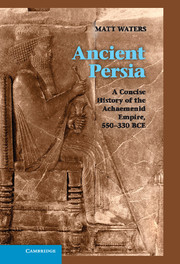Book contents
- Frontmatter
- Dedication
- Contents
- List of Figures
- List of Maps
- Achaemenid Royal Inscriptions and Classical Sources
- Acknowledgments
- Map
- 1 Introduction: Tracking an Empire
- 2 Forerunners of the Achaemenids: The First Half of the First Millennium BCE
- 3 Persia Rising: A New Empire
- 4 From Cyrus to Darius I: Empire in Transition
- 5 Darius, the Great King
- 6 Mechanics of Empire
- 7 Xerxes, the Expander of the Realm
- 8 Anatomy of Empire
- 9 Empire at Large: From the Death of Xerxes to Darius II
- 10 Maintaining Empire: Artaxerxes II and Artaxerxes III
- 11 Twilight of the Achaemenids
- 12 Epilogue
- Appendix A – Timeline
- Appendix B – Chronological Chart of Achaemenid Persian Kings
- Appendix C – Lineages of the Achaemenid Royal Family
- Appendix D – Further Readings
- Notes
- Index
12 - Epilogue
Published online by Cambridge University Press: 05 June 2014
- Frontmatter
- Dedication
- Contents
- List of Figures
- List of Maps
- Achaemenid Royal Inscriptions and Classical Sources
- Acknowledgments
- Map
- 1 Introduction: Tracking an Empire
- 2 Forerunners of the Achaemenids: The First Half of the First Millennium BCE
- 3 Persia Rising: A New Empire
- 4 From Cyrus to Darius I: Empire in Transition
- 5 Darius, the Great King
- 6 Mechanics of Empire
- 7 Xerxes, the Expander of the Realm
- 8 Anatomy of Empire
- 9 Empire at Large: From the Death of Xerxes to Darius II
- 10 Maintaining Empire: Artaxerxes II and Artaxerxes III
- 11 Twilight of the Achaemenids
- 12 Epilogue
- Appendix A – Timeline
- Appendix B – Chronological Chart of Achaemenid Persian Kings
- Appendix C – Lineages of the Achaemenid Royal Family
- Appendix D – Further Readings
- Notes
- Index
Summary
Alexander cast himself in the role of Darius III’s avenger. As he consolidated and expanded his conquests, it was necessary to put the Empire on a stable footing as he prepared for the future. Just as the Persians were “new” conquerors two centuries earlier under Cyrus, Alexander was likewise. But there were many differences, not least of which was familiarity. The Persians had lived in close proximity with the neighbors whom they conquered, in the core regions of Iran and Mesopotamia, for centuries previous. The Macedonians were an entirely foreign element to the region. And what Cyrus built almost from scratch Alexander conquered as a mature, unified entity. Cyrus’ task had been to build; Alexander’s was to prevent dissolution.
Alexander’s fusion policy – the joining of Iranian and Macedonian elites – is debated in its particulars. Alexander recruited Iranian troops from throughout the eastern satrapies, including a specialized troop of 30,000 young men who were to learn Greek and to train in Macedonian tactics (Arrian 7.6.1 and compare Quitus Curtius 8.5.1). In 327 BCE Alexander married Rhoxane, the daughter of Oxyartes, an Iranian nobleman who was appointed as a satrap. Whatever other reasons motivated Alexander, this act secured allegiances among the eastern Iranian nobles. After his return from the Indian campaign in 324, Alexander also married the Achaemenid princesses Stateira (daughter of Darius III) and Parysatis (daughter of Artaxerxes III). At the same time he staged a mass marriage ceremony at Susa between members of his Companions (his own elite Macedonian corps) and Iranian noble women. This act recalls Darius I’s marriage to Cyrus’ daughters, but Alexander took the symbolism to an entirely new level by including dozens of his own nobility in the same process. The mass marriage in particular reveals Alexander’s large-scale plan to integrate the Iranian and Macedonian elite, to form effectively a new ruling class.
- Type
- Chapter
- Information
- Ancient PersiaA Concise History of the Achaemenid Empire, 550–330 BCE, pp. 217 - 220Publisher: Cambridge University PressPrint publication year: 2014



